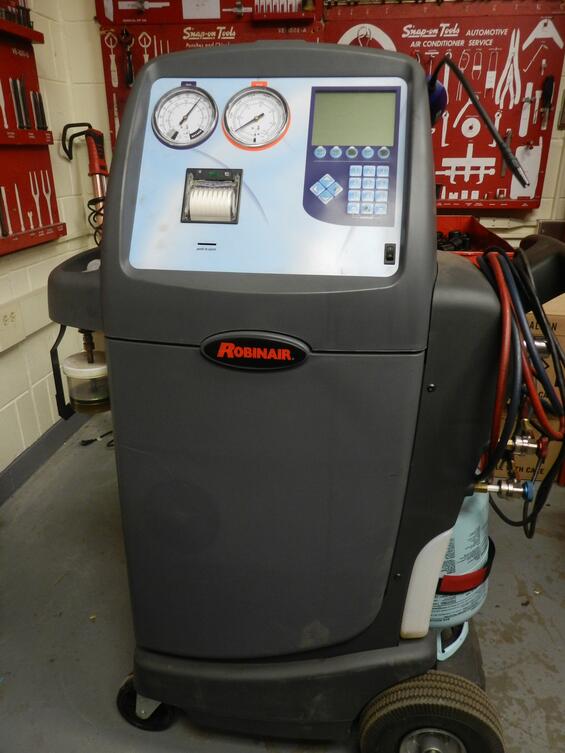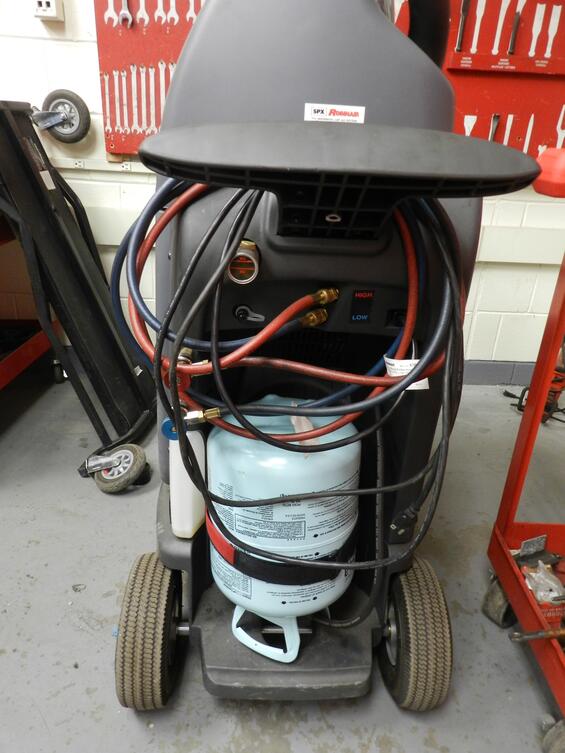Download this Fact Sheet as a PDF
Download the MassCAR Refrigerant Recycling Systems Fact Sheet.
The Benefits
Improve Accuracy and Ease When Recharging Refrigerant
Refrigerant recovery and recharging systems are highly accurate when recharging. The best systems also automatically weigh the refrigerant, measure and separate out oil, and check for leaks.
Reduce the Need to Purchase New Refrigerant
Shops that do a lot of A/C work can make money during the payback period by investing in a good quality refrigerant recovery and recycling system. The average cost of one of these systems is $3,500, so at about $70 to recharge the refrigerant, the payback period may start as soon as several months after purchase. Even if your shop has to compensate for refrigerant lost during use of the car, the need to purchase new refrigerant will be reduced significantly.
Reduce Air Pollution
Because the in-shop recycling units are many times closed systems, the vapors are appropriately contained (as is required by Section 608 of the Clean Air Act) and the materials are reused, which reduces the use of virgin materials.

The front of a refrigerant recovery and recharging system.
Take the Next Step
Talk to a Supplier
Ask a supplier about the models available for vehicle refrigerant recycling. See below for several important factors to bring up when talking to a supplier.
Get a Reference
Some of the MassCAR partners make use of this technology. The MA Office of Technical Assistance (617-626-1060) can also assist you in finding information on refrigerant recycling.
Things to Consider
Different Types of Refrigerant
Most people regularly refer to refrigerant as “Freon,” but new formulations better meet air quality regulations concerning the global warming potential (GWP) of refrigeration chemicals. Vehicle manufacturers are given incentives to use refrigerant formulations with less GWP. A formulation called R-134a is one of the most widely used refrigerants. However, another formulation, R-1234yf (also called HFO-1234yf), is increasingly being used.
Different formulations could affect the performance of your refrigerant recovery and recycling unit. When purchasing new equipment, be sure to raise the issue of different refrigerant formulations with your vendor. Consider the following resources:
- As of 2025, R-1234yf is being used in most light-duty vehicles. See this U.S. EPA report about alternative refrigerants.
- Substitutes in Motor Vehicle Air Conditioners - a list of EPA-approved refrigerants including trade names.
The Purity of the Refrigerant
Attempting to recycle impure or contaminated refrigerants can damage your refrigerant recovery and recycling system. Be sure to consult with your supplier about the specific steps you should take to protect your investment, while maximizing the amount of refrigerant you recycle. Suppliers might recommend that you purchase a refrigerant identifier, which you can use to confirm the type of refrigerant found in vehicles you service. They also might provide guidelines for determining whether refrigerants contain dust, dirt, and other fluids that can harm your recycling unit.
Disposal
All refrigerant that cannot be recycled onsite must be collected and shipped to an authorized facility for reclamation. It is illegal for shops to let refrigerants evaporate or dispose of refrigerants by other means. Contact your hazardous waste pick-up company to see what their policies and procedures are concerning refrigerant or contact an approved facility. For more information about Hazardous Waste, see the webpage for “Hazardous Waste Management.”
Options for Leasing and Buying a Recycling Unit
Ask your supplier to recommend models based upon your volume of A/C work and the types of vehicles you service. Suppliers may offer recovery and recycling units for purchase or for lease. The best option for your shop will depend on the amount of refrigerant you typically encounter.
Technician Training and Safety
The EPA requires Motor Vehicle Air Conditioning (MVAC) training for all technicians who handle refrigerant. See the following section for further information on training programs. Some training programs available to Massachusetts businesses are listed below. Ask your supplier about trainings and what else technicians need to know about safely operating the machines.

Alternate view of the refrigerant recovery and recharging system.
Find Additional Information
- To handle refrigerants, technicians need to be trained at an EPA Approved Technician Training Program.
- See the Mobile Air Conditioning Society’s Certification Training Manual
- See the ASE training program for recovery and recycling of refrigerants.
For more information, see ASE’s booklet on refrigerant recovery and recycling.
Success Stories
“We’ve absolutely seen payback with our model. The amount of refrigerant we have to purchase has gone down 50 percent. It’s a great tool.”
Contact
Phone
You will be connected to the person who can best answer your questions.